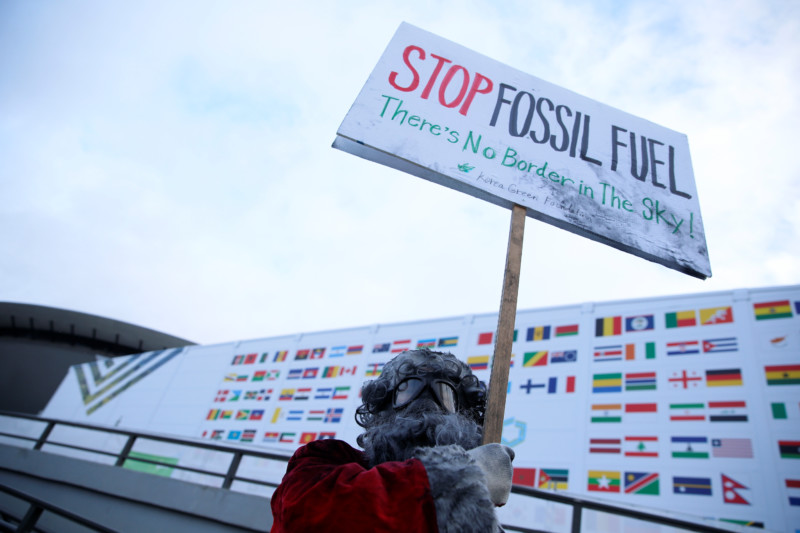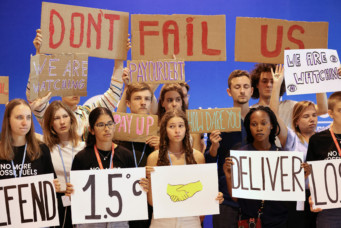Fuelling Transition or Entropy?
Reflections on the politics of climate change, fossil fuels, the destruction of trust, and the narratives we consume

Environmental activists protest against the fossil fuel industry at the COP24 in Katowice, Poland, Dec. 10, 2018. Agencja Gazeta/ Grzegorz Celejewski/Reuters
In the late 1980s, the world was waking up to a crisis of global proportions; climate change was beginning to be seen as a serious issue and policies and protocols were being drawn in response. The Montreal Protocol, an international treaty established in 1987 to limit the use of ozone-depleting substances, had just gone into force as public concern around the environmental impact of human activity was growing exponentially. The Intergovernmental Panel on Climate Change (IPCC) had been established in 1986—a year which saw particularly destructive droughts and heatwaves. The fossil fuel industry, under intense pressure from international efforts to address this budding crisis, now infamously seized this opportunity to build narratives around uncertainty and characterize mass concern as ill-informed hysteria.
It is now widely documented that, while attempting to underplay the science projecting the serious consequences of under-regulated and unsustainable fossil-fuelled capitalism, companies like Exxon systematically strategized to continue with business as usual. On February 22, 1989, Duane Levine, Exxon’s then-Manager of Science and Strategic Development, delivered a presentation to the fossil fuel giant’s Board of Directors, stating that: “In spite of the rush by some participants in the greenhouse debate to declare that the science has demonstrated the existence of PEG (potential enhanced greenhouse) today, I do not believe such is the case. Enhanced greenhouse is still deeply embedded [sic] in scientific uncertainty, and we will require substantial additional investigation to determine the degree to which its effects might be experienced in the future.”
What arguably began in this period was a war of narratives between the fossil fuel industry, organizations working to stem environmental disaster, and the media that reported on them. This war continues, albeit in a more evolved manner, to this day. Amid damning evidence of engaging in willful manipulations of information and the burying of scientific proof of the damage being done, the roots of a deep mistrust in any assertions by the fossil fuel industry to transition to more sustainable practices also began to grow.
Throughout the late 1980s, 90s, and into the 2000s, the fossil fuel industry invested heavily in repositioning climate science to reflect uncertainty in public messaging, and characterized reporting on future scenarios as hysteria and falsehood. Mobil, for its part, ran paid advertorials in some of the most widely distributed publications often coinciding with major international climate conferences. With headlines like “Lies they tell our children,” “Apocalypse No” and “Unsettled Science,” these advertisements disguised as news pieces slammed educators and the media for propagating sensationalized doomsday scenarios while at times passive-aggressively criticizing environmentalists for hypocrisy.
“Everybody, of course, remembers the Earth Summit and the tons of paper used up in reporting on it—paper now buried in landfills around the world,” one such advertorial proclaimed alongside dubious mentions of unseasonably cool temperatures proving the sky was not falling as the media would have you believe.
Incidentally, this same advertorial cited in detail the infamous “Heidelberg Appeal,” a document signed by nearly 500 scientists to counter concerns around global warming being propagated by the IPCC, scientists, environmental activists, and the media. It ultimately emerged that the appeal was coordinated by proponents of industry-funded scientific research, among them the tobacco, chemical, and fossil fuel industries alongside climate change-denying organizational fronts, including the Science and Environment Policy Project and the Global Climate Coalition.
At the core of the industry’s public relations was climate change denialism, more specifically the strategy of emphasizing the unreliability of climate models. A 1988 Exxon memo called into question the soundness of the science around the greenhouse effect: “The climate models are not very reliable because approximations are used to represent poorly understood interactions.”
However, in the decades since, these models have been proven to be by and large accurate. As veteran climate scientist Mark New put it: “If you look at projected global temperature changes for a given amount of greenhouse gas forcing, the best estimate is pretty much the same as it was thirty years ago. If you’d asked me to forecast the temperature now, based on what the historical emissions have been up to today, the climate models would have done a pretty good job of telling you that the Earth has warmed by a bit more than a degree over the last thirty years globally.”
More broadly, the fossil fuel industry has a long history of both indirect and direct participation in and influence upon UN Climate talks. This is likely a strategy to ensure they have skin in the game as global leaders meet to negotiate and draft energy and environmental policies that, in theory, could significantly impact their ability to continue to operate as usual. In recent years, perhaps because of the newfound momentum to codify reducing carbon emissions on an international scale, the extent of their participation seems to have expanded. At COP22 in Marrakech, held the year after the 2015 Paris Agreement was signed, representatives from major oil, gas, and coal companies participated through national and corporate bodies including the World Coal Association and various national and regional business councils. COP24 in Poland was sponsored by several companies benefiting from the exploitation of fossil fuels, particularly coal, including PGE, the country’s largest power company, and JSW, a major producer of metallurgical coal. The Royal Dutch Shell company was platformed via a side event to present their so called “Sky Scenario” detailing what they describe as a “technologically, industrially, and economically possible route forward.”
With more than 500 attendees from the sector, the sheer number of industry representatives at COP26 in Glasgow, Scotland, was widely criticized. This staggering number, however, was surpassed during last year’s COP27 in Sharm El-Sheikh, Egypt, where reports indicated upwards of 600 representatives from the industry attended. In a recent address at the American University in Cairo, Egypt’s Environment Minister Yasmine Fouad explained the inclusion of the sector in the conference’s Decarbonization Day. “We included them because we wanted to make sure that they were given the space to discuss, to make commitments, and to show us how they can be committed. Leaving them away from the discussion is not doing anyone any good,” she said.
How the Media Failed
The media has also often failed to provide balanced, thorough, and consistent coverage of the climate crisis. In the past, the media’s shortcomings created fodder for climate deniers and those in the fossil fuel industry to continue to thrive and drag their feet in transitioning to cleaner energies. The traditional reporting mechanisms have meant that coverage around major environmental catastrophes or global climate conferences project a temporary urgency that fades as the news cycle shifts to another crisis or event. A 2022 study published in the International Journal of Press/Politics examining legacy media coverage of UNFCCC events found significant spikes in coverage of climate issues around major international events such as COPs as well as inconsistency in the tone of coverage during these events. Reporting tended to emphasize the agency of those most at risk of the negative impacts of climate change, while reporting during the rest of the year was characterized by a language of vulnerability when describing those same groups. The techniques used by media organizations to increase reach and elicit emotional responses from audiences have both been adopted by the fossil fuel industry in their campaigns to sway public opinion (such as when they invoked the so-called manipulation of children through educational initiatives around environmental issues in the abovementioned advertorial “Lies they tell our children”) and have been cited as justification for claiming a lack of media credibility.
Levine made reference to the tendency toward what the industry characterized as fear mongering, warning against the risks posed to their interests by overexposure, which he predicted would cause public disquiet and further galvanize international efforts to reduce emissions. “We can expect continued pressure to overstate current scientific understanding. The media role, already prominent, is likely to increase public awareness and concern, and there will be continuing initiatives to extend international negotiations. As the degree of these efforts exceed understanding (or ability to respond constructively) there is a tendency towards a ‘crisis mentality.’”
The Trend Continues at COP28
In the years since the denial campaigns of the late 1980s, the industry has pivoted in its tactics, touting questionable alternatives such as carbon capture, biofuels, and liquified natural gas (LNG). However, the distrust cultivated over decades of dishonest and manipulative narrative construction, coupled with their omnipresence in negotiations, has increasingly undermined the global institutions developed to combat the climate crisis. This is arguably the biggest concern among climate activists and stakeholders around the appointment of Sultan Al Jaber, head of the UAE’s national oil company, to the presidency of the climate conference. There is precedent for individuals involved in the oil and gas industry taking up major posts in environment and international climate negotiations. The EU’s lead negotiator during COP23 in Bonn, Germany, was Miguel Arias Cañate, who held the position of European Commissioner for Energy and Climate Action from 2014–2019. Cañate, who divested his substantial shares in two oil companies based in the Canary Islands during his nomination for the post, has been widely criticized for his support of unsustainable energy practices, including a move to approve fracking in Spain while Minister of Environment.
Al Jaber’s appointment, however, comes at a different moment, and he is a different figure representing a different context. Over the last several years the world has existed in this visceral push and pull between the economic consequences of COVID-19 and energy insecurity emerging in large part from the war in Ukraine on the one hand, and a newfound and increasingly mainstream urgency around the climate crisis on the other. In many ways, Al Jaber is an embodiment of this conflicting dichotomy. As CEO of Adnoc, the UAE’s national oil company, he greenlit plans to almost double oil production by 2027. But Al Jaber is also chairman of a massive multinational renewable energy company with a stated capacity to displace over 19 million tons of CO2 annually. In theory, his two roles could represent real progress toward energy transition; however in practice, given the objective of increased fossil fuel production from the UAE, their coexistence seems to signal a general uptick in energy production rather than a political or economic to move toward a green economy in any revolutionary way, at least for the time being. Economic interests compounded by historical reliance on fossil fuel production have almost certainly stymied the development and implementation of relevant policy initiatives to roll back the UAE’s oil and gas industry, as competing interests create friction in the energy space.
In Levine’s 1989 presentation, he stated that “policy initiatives are being advanced now and they could well out-pace scientific progress.” This was an argument for blocking policy that would hurt the fossil fuel industry’s commercial interests. In reality, the opposite has happened: As early projections have increasingly proven accurate and the science of climate change has continued to advance, it is policy that has failed to move forward with sufficient speed. The decades-old, coordinated campaigns of the fossil fuel industry have played no small role in this failure.
Sarah El-Shaarawi is managing editor of the journal Arab Media & Society and a contributing editor at Africa Is a Country. She is a founding coordinator of the Arab Science Journalism Forum. Her writing has appeared in a variety of publications including Foreign Policy, Newsweek Middle East, The National, and Stranger’s Guide, among others. She is also the winner of the 2022 Dalton Camp essay prize. On Twitter: @SarahElShaarawi
Read More




